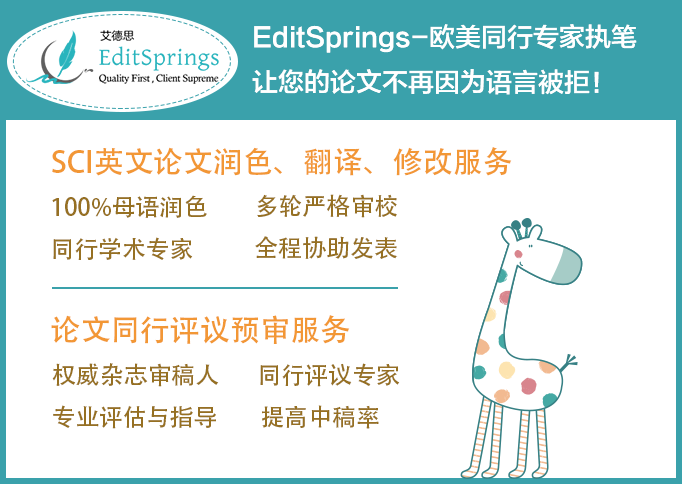来自美国波士顿

微信扫码关注公众号进行登录


完善安全信息
为了您的账号安全,请完善以下信息


来自美国波士顿
更专业的论文润色机构
微信扫码登录
微信扫码关注公众号进行登录


来自美国波士顿
更专业的论文润色机构
手机验证码登录
账号密码登录
微信扫码登录
微信扫码关注公众号进行登录
常被误用的词和表达方式(1)-EditSprings艾德思
Words and Expressions Commonly Misused
—— Selected from 《The Elements of Style》by William Strunk, Jr.
Many of the words and expressions here listed are not so much bad English as bad style, the commonplaces of careless writing. As illustrated under Feature, the proper correction is likely to be not the replacement of one word or set of words by another, but the replacement of vague generality by definite statement.
• All right. Idiomatic in familiar speech as a detached phrase in the sense, "Agreed," or "Go ahead." In other uses better avoided. Always written as two words.
• As good or better than. Expressions of this type should be corrected by rearranging the sentence.
My opinion is as good or better than his.
=> My opinion is as good as his, or better (if not better).
• As to whether. Whether is sufficient; see under Rule 13.
• Bid. Takes the infinitive without to. The past tense is bade.
• Case. The Concise Oxford Dictionary begins its definition of this word: "instance of a thing's occurring; usual state of affairs." In these two senses, the word is usually unnecessary.
In many cases, the rooms were poorly ventilated.
=> Many of the rooms were poorly ventilated.
It has rarely been the case that any mistake has been made.
=> Few mistakes have been made.
• Certainly. Used indiscriminately by some speakers, much as others use very, to intensify any and every statement. A mannerism of this kind, bad in speech, is even worse in writing.
• Character. Often simply redundant, used from a mere habit of wordiness.
Acts of a hostile character => Hostile acts
• Claim, vb. With object-noun, means lay claim to. May be used with a dependent clause if this sense is clearly involved: "He claimed that he was the sole surviving heir." (But even here, "claimed to be" would be better.) Not to be used as a substitute for declare, maintain, or charge.
• Compare. To compare to is to point out or imply resemblances, between objects regarded as essentially of different order; to compare with is mainly to point out differences, between objects regarded as essentially of the same order. Thus life has been compared to a pilgrimage, to a drama, to a battle; Congress may be compared with the British Parliament. Paris has been
compared to ancient Athens; it may be compared with modern London.
• Clever. This word has been greatly overused; it is best restricted to ingenuity displayed in small matters.
• Consider. Not followed by as when it means, "believe to be." "I consider him thoroughly competent." Compare, "The lecturer considered Cromwell first as soldier and second as administrator," where "considered" means "examined" or "discussed."
• Dependable. A needless substitute for reliable, trustworthy.
• Due to. Incorrectly used for through, because of, or owing to, in adverbial phrases: "He lost the first game, due to carelessness." In correct use related as predicate or as modifier to a particular noun: "This invention is due to Edison;" "losses due to preventable fires."
• Effect. As noun, means result; as verb, means to bring about, accomplish (not to be confused with affect, which means "to influence").
As noun, often loosely used in perfunctory writing about fashions, music, painting, and other arts: "an Oriental effect;" "effects in pale green;" "very delicate effects;" "broad effects;" "subtle effects;" "a charming effect was produced by." The writer who has a definite meaning to express will not take refuge in such vagueness.
• Etc. Not to be used of persons. Equivalent to and the rest, and so forth, and hence not to be used if one of these would be insufficient, that is, if the reader would be left in doubt as to any important particulars. Least open to objection when it represents the last terms of a list already given in full, or immaterial words at the end of a quotation.
At the end of a list introduced by such as, for example, or any similar
expression, etc. is incorrect.
• Fact. Use this word only of matters of a kind capable of direct verification, not of matters of judgment. That a particular event happened on a given date, that lead melts at a certain temperature, are facts. But such conclusions as that Napoleon was the greatest of modern generals, or that the climate of California is delightful, however incontestable they may be, are not properly
facts.
On the formula the fact that, see under Rule 13.
• Factor. A hackneyed word; the expressions of which it forms part can usually be replaced by something more direct and idiomatic.
His superior training was the great factor in his winning the match.
=> He won the match by being better trained.
Heavy artillery is becoming an increasingly important factor in deciding battles.
=> Heavy artillery is playing a larger and larger part in deciding battles.
• Feature. Another hackneyed word; like factor it usually adds nothing to the sentence in which it occurs.
A feature of the entertainment especially worthy of mention was the singing of Miss A.
=> (Better use the same number of words to tell what Miss A. sang, or if the programme has already been given, to tell something of how she sang.)
As a verb, in the advertising sense of offer as a special attraction, to be avoided.
• Fix. Colloquial in America for arrange, prepare, mend. In writing restrict it to its literary senses, fasten, make firm or immovable, etc.
• He is a man who. A common type of redundant expression; see Rule 13.
He is a man who is very ambitious.
=> He is very ambitious.
Spain is a country which I have always wanted to visit.
=> I have always wanted to visit Spain.
• However. In the meaning nevertheless, not to come first in its sentence or clause.
The roads were almost impassable. However, we at last succeeded in reaching camp.
=> The roads were almost impassable. At last, however, we succeeded in reaching camp.
When however comes first, it means in whatever way or to whatever extent.
However you advise him, he will probably do as he thinks best.
=> However discouraging the prospect, he never lost heart.
• Kind of. Not to be used as a substitute for rather (before adjectives and verbs), or except in familiar style, for something like (before nouns). Restrict it to its literal sense: "Amber is a kind of fossil resin;" "I dislike that kind of notoriety." The same holds true of sort of.
• Less. Should not be misused for fewer.
He had less men than in the previous campaign.
=> He had fewer men than in the previous campaign.
Less refers to quantity, fewer to number. "His troubles are less than mine" means "His troubles are not so great as mine." "His troubles are fewer than mine" means "His troubles are not so numerous as mine." It is, however, correct to say, "The signers of the petition were less than a hundred, "where
the round number, a hundred, is something like a collective noun, and less is thought of as meaning a less quantity or amount.
• Line, along these lines. Line in the sense of course of procedure, conduct, thought, is allowable, but has been so much overworked, particularly in the phrase along these lines, that a writer who aims at freshness or originality had better discard it entirely.
Mr. B. also spoke along the same lines.
=> Mr. B. also spoke, to the same effect.
He is studying along the line of French literature.
=> He is studying French literature.
• Literal, literally. Often incorrectly used in support of exaggeration or
violent metaphor.
A literal flood of abuse => A flood of abuse
Literally dead with fatigue => Almost dead with fatigue (dead tired)
• Lose out. Meant to be more emphatic than lose, but actually less so, because of its commonness. The same holds true of try out, win out, sign up, register up. With a number of verbs, out and up form idiomatic combinations: find out, run out, turn out, cheer up, dry up, make up, and others, each distinguishable in meaning from the simple verb. Lose out is not.
• Most. Not to be used for almost.
Most everybody Almost everybody
=> Most all the time Almost all the time
更多科研论文服务,动动手指,请戳 论文润色、论文预审、论文翻译润色、投稿期刊推荐、论文指导及修改!
语言不过关被拒?美国EditSprings--专业英语论文润色翻译修改服务专家帮您!


特别声明:本文转载仅仅是出于传播信息的需要,并不意味着代表本网站观点或证实其内容的真实性;如其他媒体、网站或个人从本网站转载使用,须保留本网站注明的“来源”,并自负版权等法律责任;作者如果不希望被转载或者联系转载稿费等事宜,请与我们接洽。
凡注明来源为“EditSprings”的论文,如需转载,请注明来源EditSprings并附上论文链接。













 鄂公网安备:
鄂公网安备: